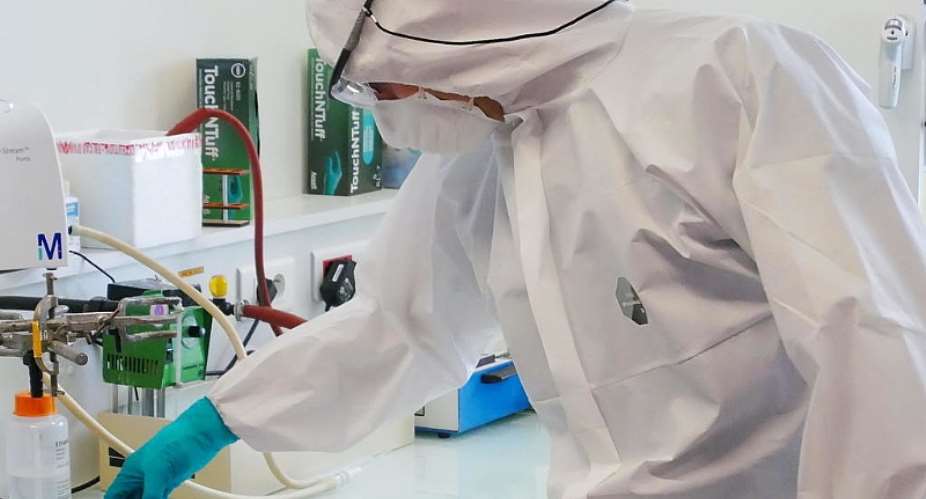Laurent Moulin and his team at the Paris water department are playing an important role in tracing the progression of Covid-19 in the French capital, by analysing hundreds of wastewater samples from the Paris region.
“By analysing these samples, we can get a global picture of the Covid-19 disease,” Moulin, Paris water director of research, told RFI.
Ever since the outbreak of Covid-19, there have been scientific publications indicating the presence of Sars-Cov-2, the virus that causes Covid-19, in the faeces of infected patients. “The findings were not surprising given that Sars-Cov-1, which causes the respiratory illness SARS, was present in the faeces of the infected people. It's quite common for these types of viruses,” Moulin says.
What makes wastewater analysis an important tool for understanding the transmission dynamics is that it accounts for both symptomatic and asymptomatic patients, which enables it to provide a comprehensive perspective of the disease in the general population.
“It's an effective monitoring and predicting tool. With our analysis we can get a picture a few days in advance. It can help the authorities to make decisions regarding new measures,” Moulin says, adding that their data is shared with both local and national health agencies.
Making waves with waste water
Given the utility of this approach, a 3.5 million-euro consortium of different institutes across France was recently formed. Called Obépine (Observatory of Epidemiology in Wastewater), a network of laboratories from Paris (Sorbonne Université and IRBA), Nancy (Université de Lorraine), Nantes (IFREMER) and Clermont Ferrand has been established for epidemiological monitoring of wastewater across the country.
Researchers use the same technique on the waste water as that used for detecting the presence of the virus in the human nasopharyngeal cavity.
The analysis of wastewater samples has already helped researchers identify a cluster of Covid-19 on an island in France. “By studying the amount of viral load in the samples obtained from a locality, we can determine the start of the infection in that area,” Moulin says.
While studying wastewater samples can point out to the progression of the disease, it cannot determine the number of people infected. “That's because the amount of viral load excreted by infected people isn't always the same. Moreover, this figure changes in a person over a period of time,” Moulin says.
While their current work focuses on Covid-19, Moulin and his team have been studying wastewater samples for other viruses. Just like coronaviruses, they can also find traces of noroviruses in wastewater, including the one responsible for gastroenteritis.





 Former Kotoko Player George Asare elected SRC President at PUG Law Faculty
Former Kotoko Player George Asare elected SRC President at PUG Law Faculty
 2024 elections: Consider ‘dumsor’ when casting your votes; NPP deserves less — P...
2024 elections: Consider ‘dumsor’ when casting your votes; NPP deserves less — P...
 You have no grounds to call Mahama incompetent; you’ve failed — Prof. Marfo blas...
You have no grounds to call Mahama incompetent; you’ve failed — Prof. Marfo blas...
 2024 elections: NPP creates better policies for people like us; we’ll vote for B...
2024 elections: NPP creates better policies for people like us; we’ll vote for B...
 Don’t exchange your life for wealth; a sparkle of fire can be your end — Gender ...
Don’t exchange your life for wealth; a sparkle of fire can be your end — Gender ...
 Ghana’s newly installed Poland train reportedly involved in accident while on a ...
Ghana’s newly installed Poland train reportedly involved in accident while on a ...
 Chieftaincy disputes: Government imposes 4pm to 7am curfew on Sampa township
Chieftaincy disputes: Government imposes 4pm to 7am curfew on Sampa township
 Franklin Cudjoe fumes at unaccountable wasteful executive living large at the ex...
Franklin Cudjoe fumes at unaccountable wasteful executive living large at the ex...
 I'll 'stoop too low' for votes; I'm never moved by your propaganda — Oquaye Jnr ...
I'll 'stoop too low' for votes; I'm never moved by your propaganda — Oquaye Jnr ...
 Kumasi Thermal Plant commissioning: I pray God opens the eyes of leaders who don...
Kumasi Thermal Plant commissioning: I pray God opens the eyes of leaders who don...
